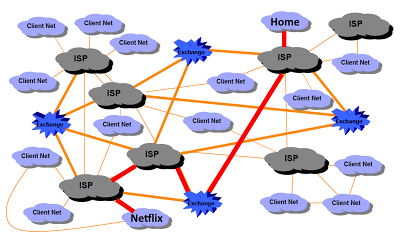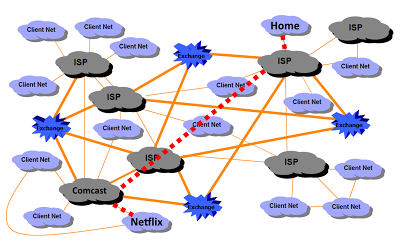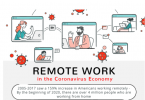aNewDomain.net — First, Comcast agreed to purchase Time Warner Cable. And then later Netflix agreed to pay Comcast for direct access to its network. The media landscape in America is changing quickly.
But questions remain. Will Netflix pass Comcast payments down to consumers? Will we get better quality and fewer buffering delays? Is this the end of network neutrality? And is this the beginning of the end for the Internet we’ve grown to love?
Maybe yes, and maybe no.
It’s true that Netflix will pay Comcast for direct access to its network. But it will save what it had previously been paying to intermediate transit networks like Cogent. The entire cost to Netflix may be more, less, or the same — no one knows for certain because the terms of the deal haven’t been revealed. I doubt that Netflix will be saving money. But if it does, we’ll have to see if it passes the savings down to consumers.
And how about speed of delivery improvements? Netflix has acknowledged performance problems in the past, and this deal should definitely help. That’s good news. Expect improvement right away.
Despite some grumbling from industry watchdogs, however, there may not have been any violations of network neutrality involved. Comcast may have been a victim of delays due to capacity problems of intermediate networks. We’ll never know.
Is there evidence that Comcast was dropping (or delaying) Netflix packets? Probably not. But this is not to say, however, that Comcast wasn’t discriminating against Netflix traffic (or that it might not do so in the future). As far as I know, there is no evidence either way.
Don’t get me wrong, I have nothing good to say about my ISP (Time Warner Cable). I’m absolutely certain that the situation will be even worse if the Comcast deal is approved. That sort of concentrated power cannot be good for anyone except those who have it.
Timothy Lee, a reporter with The Washington Post, points out that one result of this Comcast/Netflix deal may be the elimination of transit ISPs like Cogent that are in a competitive market. Lee is right: Comcast and other companies that connect consumers ultimately face little or no competition.
GigaOm’s Stacey Higginbotham has suggested that transparency — opening the terms of these deals to public scrutiny — might be a solution. But I remain skeptical.
The images below show the route between one’s home and Netflix before (Image A), currently (Image B), and in the future if Comcast gets what it wants (Image C).
For aNewDomain.net, I’m Larry Press.
Based in Los Angeles, Larry Press is a founding senior editor covering tech here at aNewDomain.net. He’s also a professor of information systems at California State University at Dominguez Hills. Check his Google+ profile — he’s at +Larry Press — or email him at Larry@aNewDomain.net.
















